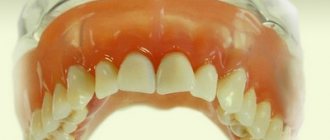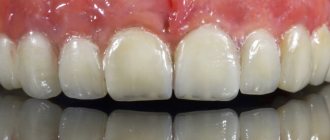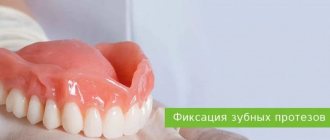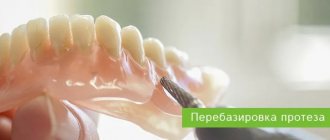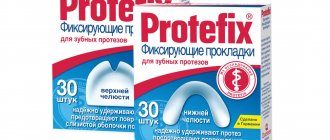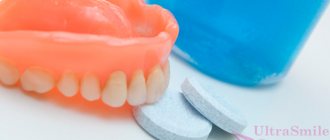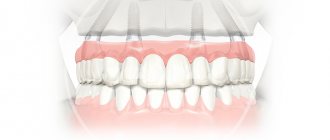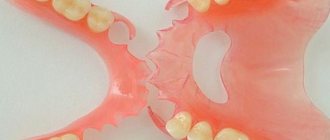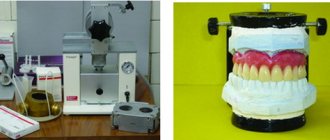More than half of those who wear removable dentures consider the main problem with their use to be unreliable fixation, which causes the dentures to move during eating, talking or laughing. To increase the reliability of fastening the prosthesis in the mouth, several types of products (creams, adhesives, gels) have been developed for gluing the base of the removable structure to the soft tissues of the palate and alveolar process.
Creams to improve fixation are most often used when using dentures made of nylon or acrylic plastic. Fixing agents are also used when wearing temporary removable structures. Well-made removable clasp structures, as well as removable dentures supported by implants, do not require additional fixation.
Fixing gel for dentures is practically no different from cream in its functions, but they differ in consistency. The cream is thicker. Denture fixation cream is best suited for those who are using removable dentures for the first time. It is more difficult to apply too much cream, and too much cream will not allow the prosthesis to be securely fixed.
We will consider the best creams for fixing dentures in detail in our rating.
No. 1 in the rating cream for fixing dentures Rocs
Price from 230 to 350 rubles.
Rating – 10.0
The Russian-Swiss-made cream guarantees 12-hour fixation of the prosthesis, which is not weakened by consuming hot food and drinks. When distributed over the surface of the prosthesis base, it ensures tightness and protects soft tissues from food particles getting under the prosthesis. The cream contains ingredients based on menthol and mint, which refresh the mouth and protect against unpleasant odor from the mouth.
From reviews : Irina Nikolaevna, 56 years old – “It so happened that I had to get a lower removable partial denture. But it wasn’t very successful, either I have such a cavity in my mouth, or the dentist didn’t make it very well, but when talking and eating, the denture kept falling out. Having tried many brands of fixatives, I settled on Rox cream. This is the best cream for dentures, it does not dissolve when eating or drinking, now at work I can participate in general tea parties.”
Pros:
- can be used for wet dentures;
- not washed out by liquid;
- does not dissolve when eating hot food;
- the product does not contain artificial dyes;
- does not contain zinc.
Minuses:
- quite high price;
- Thick, making application difficult.
Causes of crown loss
Several factors can provoke an unpleasant situation associated with dental crowns. They depend both on the actions of the doctor and on the actions of the patient.
- Low quality materials and cement.
- Violation of the manufacturing technique of an orthopedic structure.
- Mistakes at the stage of preparation for prosthetics.
- Development of the inflammatory process under the crown.
- End of service life of the structure.
- Mechanical injury.
The permanent crown is fixed with dental cement and lasts for several years. If the doctor did everything correctly at the preparation stage, then the structure retains its tightness and strength for a long time, and it should not fall out. This can happen due to the development of caries, which appears due to irregular or improper oral hygiene. Therefore, it is so important not to skip brushing your teeth and use additional hygiene products. And also undergo professional oral hygiene at a dental clinic once every six months.
No. 2 in the ranking cream for fixing dentures Lacalut
Photo: zubizub.com
Price from 270 to 400 rubles.
Rating – 9.8
High quality cream, produced by a German company. According to the manufacturer, when using the product, reliable fixation is ensured for at least 24 hours. Creates a thin layer between the prosthesis and soft tissues, protecting them from mechanical damage by the edge of the prosthesis, which helps adapt to a removable structure worn for the first time.
From reviews : Ivan Arsentievich, 48 years old - “Due to an injury, I lost two front teeth, the dentist made a temporary removable denture, which held up very poorly. At the pharmacy, the pharmacist advised me to buy Lacalut cream, and I am completely satisfied with the result.”
Pros:
- reliable fixation;
- pleasant taste and smell;
- thanks to the thin film created when using the cream, it protects soft tissues from chafing.
Minuses:
- high price;
- fixation is slightly weakened by consuming hot foods and drinks (especially tea and coffee).
Indications
Indications for restoration:
- significant destruction of the coronal part;
- installation of bridges;
- pathological abrasion of enamel;
- depulpation;
- injuries.
Crowns are made of metal, ceramics and metal-ceramics. Porcelain and plastic crowns are practically not used due to their fragility. Modern materials are particularly durable and wear-resistant. They are designed for long-term use. But the service life, as well as the convenience of the crown, also depends on how well it fits and how firmly it is secured.
No. 3 in the ranking cream for fixing dentures Protefix
Photo: www.queisser.ru
Price from 280 to 400 rubles (cream in 24 gram tubes costs from 140 rubles).
Rating – 9.6
Products from the Protefix series ensure reliable attachment of the prosthesis to the gum tissue for at least 10-12 hours. There are three varieties of this product: hypoallergenic cream, which, due to the absence of dyes and fragrances, causes fewer allergic reactions; as well as creams containing mint or aloe components.
From reviews : Anna, 29 years old - “I persuaded my mother to put in a clasp prosthesis, but she opted for a nylon one, which is quite poorly fixed in the mouth. The doctor advised me to use Protefix fixation cream, now my mother can calmly eat and talk without fear that her teeth will end up on the floor at the most crucial moment.”
Pros:
- economical;
- has high fixing properties;
- has no taste or smell.
Minuses:
- the cream tube contains a significant percentage of liquid;
- slightly inconvenient dispenser;
- The bottle must be tightly closed and stored in an upright position, as the product may leak.
Stages
After preparing the surface, the orthopedist makes an impression of the jaws, from which a crown is stamped or cast in the laboratory. Manufacturing takes several days. Before installing the structure, they carry out fittings - check how it fits and whether there are any defects. The crown may be too wide, narrow, or high. Fitting helps to notice shortcomings and eliminate them.
The restoration is first placed with temporary cement. The patient is given the opportunity to get used to a foreign object in the mouth, to understand whether the height is disturbing or whether the edge is cutting the gum. Only after this the structure is installed on permanent cement.
- Before fixation, the crown is treated with a special solution, degreased and dried.
- Next, the tooth is treated with an antiseptic, and the remaining moisture is removed with ether or air. In some cases, gum retraction is performed with a thread to clearly mark the junction of the artificial crown and hard tissue.
- The components for cement are mixed on a sterile plate.
- A thin layer of cement is placed inside the restoration and placed over the tooth.
- Excess is removed. The patient is asked to sit with his teeth closed. Then clean the surfaces again and rinse your mouth with a special solution. This completes the orthopedist’s work.
No. 4 in the ranking cream for fixing prostheses Fittident
Photo: harkov.promoz.com.ua
Price from 180 to 250 rubles.
Rating – 9.5
One of the best creams for dentures, but when using Fittident, people with highly sensitive gums feel a rather strong burning or tingling sensation. To avoid this effect, you need to let the cream dry on the prosthesis for at least 20-30 seconds. If there is increased saliva production, you can apply a larger amount of cream, which is then removed with a dry cloth until it hardens.
From reviews : Maria Fillipovna, 61 years old – “My daughter bought me Fittident cream; before that I used other products that did not provide good attachment. Now the prosthesis does not even have to be removed at night, it simply does not come off (even while eating). Completely satisfied."
Pros:
- when removing the denture, no traces of cream remain on the gums;
- has no pronounced taste;
- fixes the prosthesis for a long time.
Minuses:
- has a rather viscous consistency;
- can only be applied to a dry prosthesis;
- difficult to buy in pharmacies (only in big cities or in online stores).
What to do if a tooth crown falls out
- First of all, you need to save the fallen structure and try to make an appointment with the dentist as soon as possible. For example, contact our specialists by phone: 220-86-30.
- Remember that the tooth that was under the crown was left without protection, so it must be treated as carefully as possible. It is necessary to chew food on the opposite side, trying to minimize the load on the tooth to avoid fracture.
- If pain occurs, take a pain reliever.
- If it is not possible to see a doctor in the near future, then try to carefully put the structure in place; before doing this, it must be thoroughly rinsed and dried. This will help preserve the prepared tooth until your visit to the dentist.
The next method is temporary!
an orthopedic dentist within three days
- Buy dental cement (sold at the pharmacy).
- Clean the crown thoroughly with toothpaste. Dry it with a sterile piece of cloth.
- Clean the tooth from food debris using a soft-bristled toothbrush.
- Apply cement to the crown, place the crown on the tooth and hold it in place for one minute. Then close both jaws and remain in this position for about two minutes.
- Remove any remaining cement using gauze.
Never try to glue a crown with superglue. The glue is very toxic, and contact with saliva can lead to dire consequences!
No. 5 in the ranking cream for fixing dentures President
Photo: www.glavap.ru
Price from 190 to 230 rubles.
Rating – 9.4
After applying President, a dense elastic layer is formed under the prosthesis, preventing food particles from penetrating under the base of the prosthesis. In some situations, the fixation may be weakened by eating hot liquid food. The product contains fragrances and petroleum jelly.
From reviews : Igor, 49 years old – “I bought President cream for my father to fix complete removable dentures. Without additional means, they did not stay in the mouth and, in addition to the discomfort caused when eating and talking, they rubbed the mucous membrane. A thin layer of cream sets tightly and forms a film that protects the gums from the pressure of acrylic plastic.”
Pros:
- affordable price;
- good fixation;
- The tube volume is 10 ml more than its analogues.
Minuses:
- when eating, fixation weakens;
- Quite a strong taste.
Installing a crown on your teeth
No matter how badly a tooth is damaged, as long as it has a root, it can be restored. How exactly the restoration is carried out depends on the degree of tooth decay. In case of minor damage, the unit is prepared - the top layer equal to the thickness of the crown is removed. Metal-ceramic crowns consist of 2 layers: metal and ceramic, so they require the deepest preparation. Ceramic crowns are thinner and remove a small layer of hard tissue. Zirconium crowns are thin and require minimal layer removal.
If the upper part is destroyed by 50% or more, then the crown is fixed with a pin. A fiberglass rod is inserted into the canal to serve as a support for the restoration.
No. 6 in the ranking prosthetic fixation cream Corega
Photo: www.coregacrem.ru
Price from 200 to 250 rubles.
Rating – 9.3
The composition of any of the Coreg fixing creams includes substances that do not cause allergies and do not have a negative effect on the human body when used correctly. All the same, you cannot use the cream more than 2 times a day, and before applying a new portion, the remains of the fixing agent must be thoroughly washed off from the prosthesis.
From reviews : Anatoly, 63 years old - “Unfortunately, reliable fixation of the device lasts no more than 3-4 hours, and even after eating or drinking, the fastening of the prosthesis deteriorates significantly. You’ll have to choose something else, although this cream is quite convenient to use.”
Pros:
- affordable price;
- simplicity and ease of use;
- Can be applied to wet dentures.
Minuses:
- quickly washed out with water;
- the actual duration of reliable fixation does not exceed 3 hours;
- when eating, the denture falls out because the cream dissolves and enters the stomach along with food;
- ends quickly;
- The neck of the tube is too wide, so it is difficult to apply a small amount of product;
- after prolonged use, the mucous membrane swells.
Materials for fixing crowns
Cement for fastening restorations must perform 2 main functions: securely fix the crown and fill the microgaps between it and the dentin. Several types of fixing materials are used in dentistry:
- Glass ionomer cements
(GIC). They are good because they have anti-caries properties and are not afraid of micro-leaks. Used for structures made of metal, with a metal base and ceramic. - Glass ionomer cements modified with composite
(GICMC). Easy to use and very durable, such materials are used for restorations made of metal, zirconium, and lithium disilicate. - Composite
. The most modern materials. They produce cements that harden as a result of a chemical reaction, light radiation and double curing. Suitable for fixing metal-ceramic, zirconium, ceramic, and lithium disilicate crowns.
All these groups are divided into numerous subgroups and the doctor selects the material for fastening based on the geometry of the tooth, crown material, and clinical case.
Dental cements have been used for a long time, they are well studied, application methods have been worked out and are simple in nature. These materials reliably fix restorations and can serve for a long time.
The disadvantages of cements are that mixing is done by hand and errors in proportions are possible. This leads to de-cementing. Excess acids negatively affect the condition of dentin.
Rules for using fixing cream
Even the best denture cream will not provide a secure hold if applied incorrectly. In order to correctly apply the cream to fix dentures, you must strictly adhere to several rules:
- The denture must be clean and dry - before applying the product, it should be cleaned with a regular paste or a special product and wiped dry with a soft cloth.
- The cream is applied strictly along the lines indicated in the instructions, and you should start using the fixing composition with a minimum amount. A large volume of cream applied to the denture base will disrupt the fixation strength.
- Before putting on the prosthesis, the gums should be rinsed and wiped with a napkin.
- The worn removable structure is pressed tightly against the surface of the alveolar process for at least 20 seconds.
- After the prosthesis is fixed, you should not eat, drink or talk for 10-15 minutes.
- After removing the structure from the oral cavity, it must be thoroughly cleaned of any remaining fixative composition.
- The cream should not be used more than once a day, and the amount should not exceed the recommended amount. Otherwise, there is a possibility of developing neurological diseases caused by the consumption of large amounts of zinc, which is part of the fixatives.
Attention! There are contraindications, consultation with a specialist is required
Purpose of glue in prosthetics
Creams and adhesives in dentistry are used both for fixing dentures and as auxiliary materials in combination with other fasteners to ensure optimal strength and stability of the structure.
Suitable for attaching removable dentures made of plastic, nylon and other materials. Apply in the following cases:
- regular fixation of removable structures;
- temporary fixation of fixed prostheses when they break for the period of replacement;
- fixation of the crown when the cement underneath is destroyed;
- ensuring a tighter fit of the crowns and preventing chafing of the gums.
The adhesive is selected based on the duration of fixation, consistency, the presence or absence of flavorings in the composition, the individual characteristics of the oral cavity and the type of prosthetic structures.
"Protefix" (Germany)
Among the positive properties of the popular cream for fixing dentures, Protefix (“Protefix”), we can note: economical consumption, excellent adhesion, dense structure that limits the penetration of food. The manufacturer has released three types of “Protefix”: without coloring and aromatic components (suitable for allergy sufferers), with mint, and with aloe. The product deservedly receives positive reviews from users due to its affordable price (about 200 rubles) and the possibility of use for increased sensitivity of the mucous membrane. Among the disadvantages, users note the inconvenience of the dispenser and the weakening of the fixation under the influence of hot food.
"President" (Italy)
Fixing cream for dentures PresiDENT (“President”) creates a dense layer under the structure that prevents particles of food mass from entering. The manufacturer assures that the effect of the product lasts throughout the day and can reach 36 hours. The absence of allergies, economical consumption, low cost (within 250 rubles) and high quality of the composition allow it to occupy a high position in the TOP of means for retaining removable structures. However, many people are faced with the fact that they cannot buy this product in all pharmacy chains.
Prosthetics on implants
Crowns are secured to implants in 2 ways: with cement or a screw
. This depends, first of all, on the type of implantation and the implant models that are used. But anatomical features and clinical manifestations play a big role.
Cement fixation of crowns on implants has its pros and cons. The process of attaching a restoration to an implant using cement is not much different from prosthetics on natural teeth. It is simple, well studied, and allows fixation in complex cases where a screw fixation would require enormous effort and skill.
The disadvantages include the possibility of peri-implantitis, which can be caused by excess cement. When using cement, the crown cannot be repaired, only replaced.
Screw fixation of crowns to the implant prevents cement from getting on the tissue. There is a possibility of repair and correction. The results of joining metal to metal without a cement layer are better. The single design of abutment and crown reduces the risk of infection.
However, the fitting of a screw-fixed prosthesis is more delicate, requires certain skills, and the price of designs with screws is higher.
This is why choosing a doctor is so important. A qualified implantologist takes into account dozens of details before choosing an implantation method, which determines whether the crown will be screw-fixed or cemented, and an experienced orthopedist knows how to work with both.
